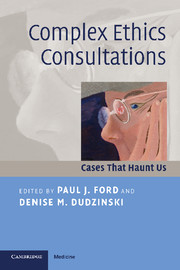Book contents
- Frontmatter
- Contents
- List of contributors
- Foreword
- Acknowledgments
- Introduction: Live and learn: courage, honesty, and vulnerability
- Part I Starting at the beginning: prenatal and neonatal issues
- Part II The most vulnerable of us: pediatrics
- Part III Diversity of desires and limits of liberty: psychiatric and psychological issues
- 9 Helping staff help a “hateful” patient: the case of TJ
- 10 Ulysses contract
- 11 Misjudging needs: a messy spiral of complexity
- 12 When the patient refuses to eat
- Part IV Withholding therapy with a twist
- Part V The unspeakable/unassailable: religious and cultural beliefs
- Part VI Human guinea pigs and miracles: clinical innovations and unorthodox treatment
- Part VII The big picture: organizational issues
- Conclusions, educational activities, and references
- Index
11 - Misjudging needs: a messy spiral of complexity
Published online by Cambridge University Press: 03 May 2010
- Frontmatter
- Contents
- List of contributors
- Foreword
- Acknowledgments
- Introduction: Live and learn: courage, honesty, and vulnerability
- Part I Starting at the beginning: prenatal and neonatal issues
- Part II The most vulnerable of us: pediatrics
- Part III Diversity of desires and limits of liberty: psychiatric and psychological issues
- 9 Helping staff help a “hateful” patient: the case of TJ
- 10 Ulysses contract
- 11 Misjudging needs: a messy spiral of complexity
- 12 When the patient refuses to eat
- Part IV Withholding therapy with a twist
- Part V The unspeakable/unassailable: religious and cultural beliefs
- Part VI Human guinea pigs and miracles: clinical innovations and unorthodox treatment
- Part VII The big picture: organizational issues
- Conclusions, educational activities, and references
- Index
Summary
Case narrative
Mr. William Winthorpe, a 60-year-old patient, was admitted to the hospital with ischemic brain injury secondary to an unwitnessed cardiopulmonary arrest. He had a medical history of end-stage kidney, liver, and heart failure, needing chronic dialysis three times a week. In the first week at the intensive-care unit (ICU) after the arrest, a neurologist told Mr. Winthorpe's sons and daughters that, based on brain imaging, Mr. Winthorpe had no real chance of waking up or regaining any significant cognitive function. Although he was not brain dead, Mr. Winthorpe would have no significant cognitive recovery. The family was about to agree to withdraw aggressive therapies when the patient began to respond to external stimuli. These events occurred prior to my involvement as a clinical ethics consultant and set the context for the events that followed.
Several weeks after the arrest, and after the patient was discharged from the ICU to a regular hospital ward, a hospitalist requested a clinical ethics consultation. According to the hospitalist, the family did not understand the futility of current aggressive therapies. The hospitalist said Mr. Winthorpe sooner or later would die from an infection if not from his other end-stage organ diseases. At the time of the consultation the patient had begun to follow basic commands, which the family interpreted as the potential for meaningful recovery.
When I met with Mr. Winthorpe's family and medical team, the family expressed a desire to see how much cognition he could regain given that the original neurologist had been wrong about the impossibility of cognitive improvement.
- Type
- Chapter
- Information
- Complex Ethics ConsultationsCases that Haunt Us, pp. 88 - 94Publisher: Cambridge University PressPrint publication year: 2008



